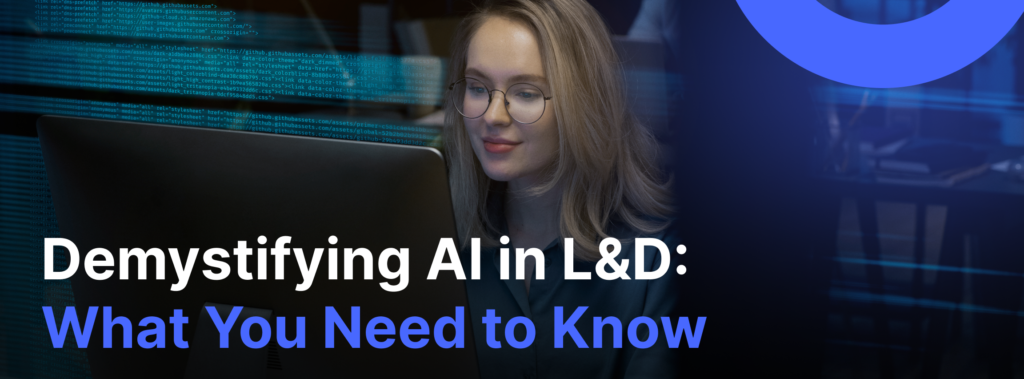People are the engine of a company. Every organisation’s progress depends on its employees’ professional development, starting with the top management.
Imagine that Kristina, a Head of Marketing, works in your company. She is delighted to learn new things, immerse herself in clients’ psychology, and attend dozens of professional trainings. She tries, experiments, and immerses her colleagues and mentees in the material she learns. Kristina grows, and her team grows with her. But this is in a perfect universe. What do we have in reality? Only 26% of employees, according to the 2023 Workplace Learning Report, say their organisation challenged them to learn a new skill. Does it mean that learning and development practices for the companies are dead?
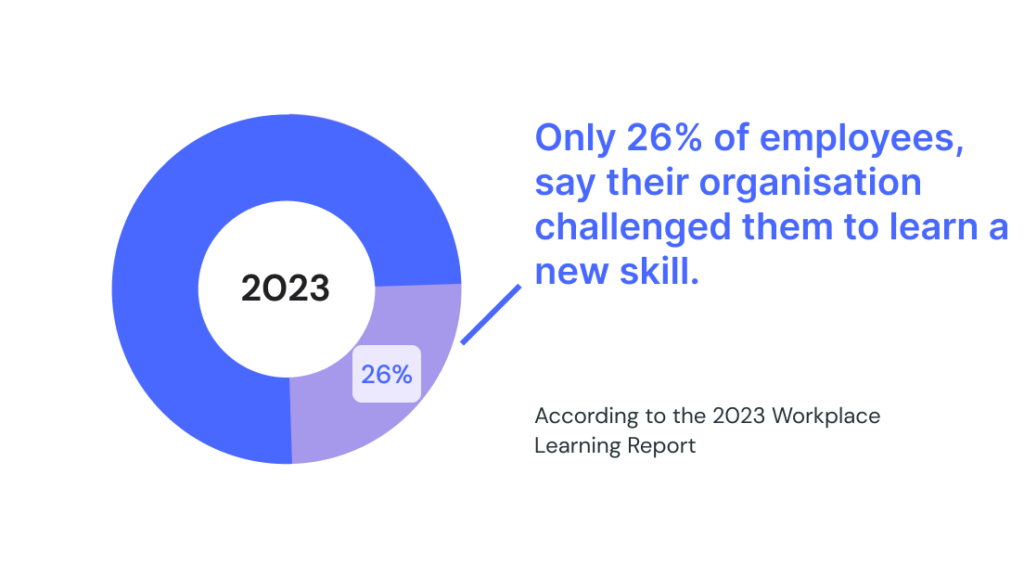
According to Statista, the global e-learning market itself is projected to reach $325 billion by 2025. Of course, the HRD in your company would love to be able to use the L&D for the growth of the company. As long as Artificial Intelligence (AI) has become a catalyst for change across industries, using AI in learning and development (L&D) is no exception.
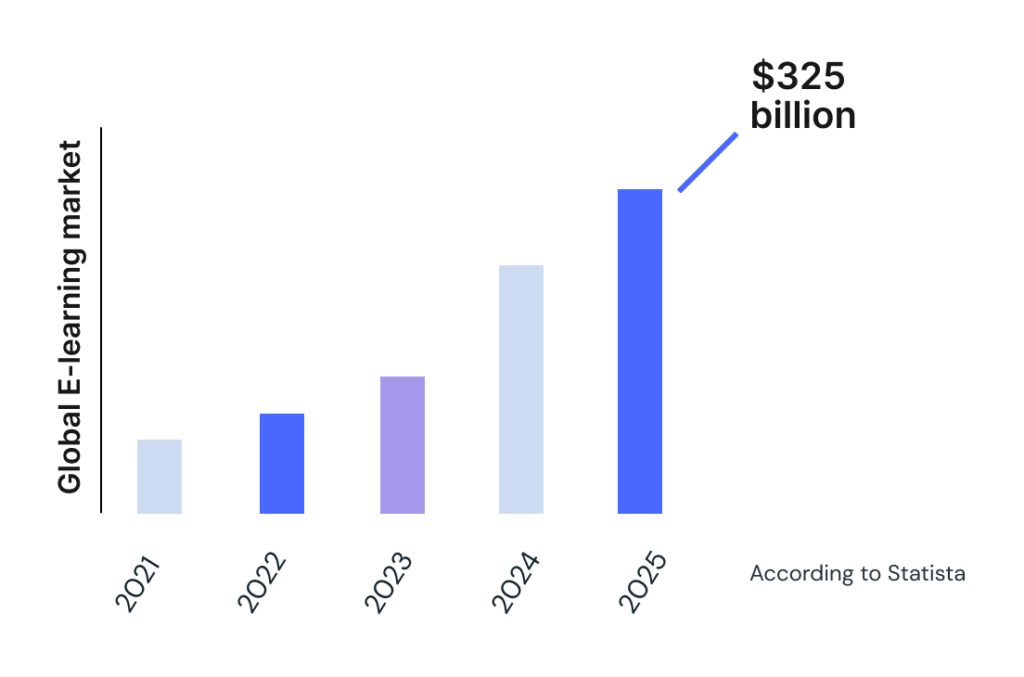
Before delving deeper, let’s clarify essential terms. AI in Learning and Development refers to incorporating artificial intelligence technologies to optimise educational processes. This includes AI-driven learning platforms, intelligent tutoring systems, and automated assessment tools. Let’s have a look at a few insights on what can be done by AI in learning and development.
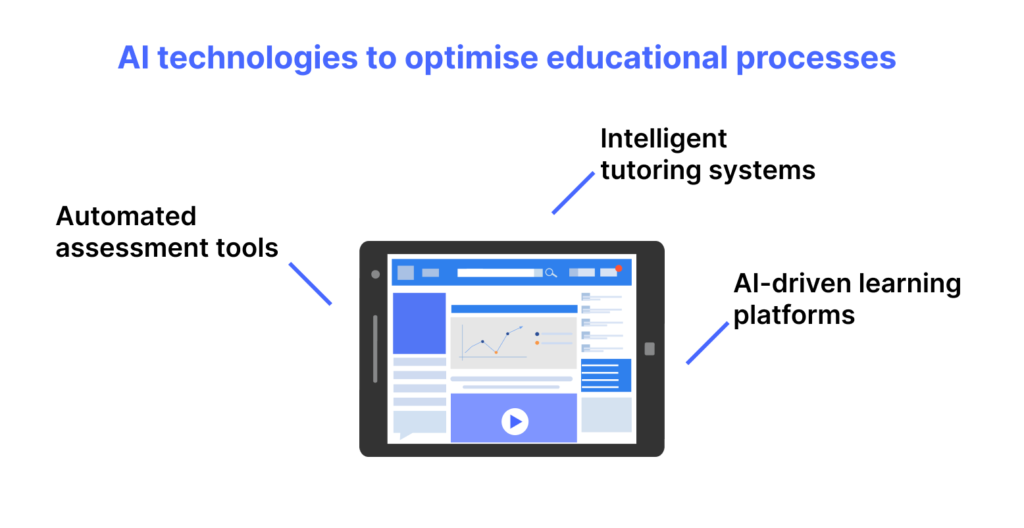
Personalised Learning Trajectories
Have you ever wondered about the transformative impact of AI in learning and development strategies of your organisation? One remarkable aspect that immediately surfaces is the concept of personalised learning trajectories. AI, through meticulous analysis of employee performance and preferences, facilitates the crafting of individualised educational plans. For instance, consider a scenario where AI algorithms assess the strengths and weaknesses of each employee, identifying their preferred learning styles. With this data in hand, AI-powered platforms can create personalised learning materials, ensuring employees interact with content that suits their specific needs. It doesn’t just make the learning experience better; it also nurtures a culture of ongoing improvement within the organisation.
From corporate training programs to academic institutions, AI redefines how we learn. Platforms like Coursera and edX utilise AI to recommend courses based on user behaviour, creating a more personalised educational journey.
Competency Assessment and Forecasting
A paradigm shift in designing impactful training programs lies in understanding current and future skill requirements. The integration of AI for learning and development, facilitated by intelligent algorithms, allows a systematic analysis of our ongoing data to project the future significance of specific skills. Consider a scenario where a marketing team employs AI to evaluate the current campaign strategies and predict the evolving trends in digital marketing. This analytical foresight enables the strategic development of training modules tailored not only to immediate needs but also poised for the forthcoming demands of the profession.
This application of AI serves as a guiding force, ensuring that our learning initiatives are not just pertinent today but are also strategically positioned for success tomorrow. The use of AI in this manner becomes synonymous with precision and foresight, aligning training strategies with the evolving requirements of the professional landscape.
Adaptive Learning Platforms
Imagine a workplace where everyone’s uniqueness is not just acknowledged but also embraced in how they learn. That’s the crux of Adaptive Learning Platforms, and it’s not just a theory; it’s a game-changer supported by real numbers. Picture this – 77% of people perform better when they get to learn in a way that resonates with their individual style. This is not a random statistic; it’s from a study by the eLearning Industry, showing how personalized learning makes a difference.
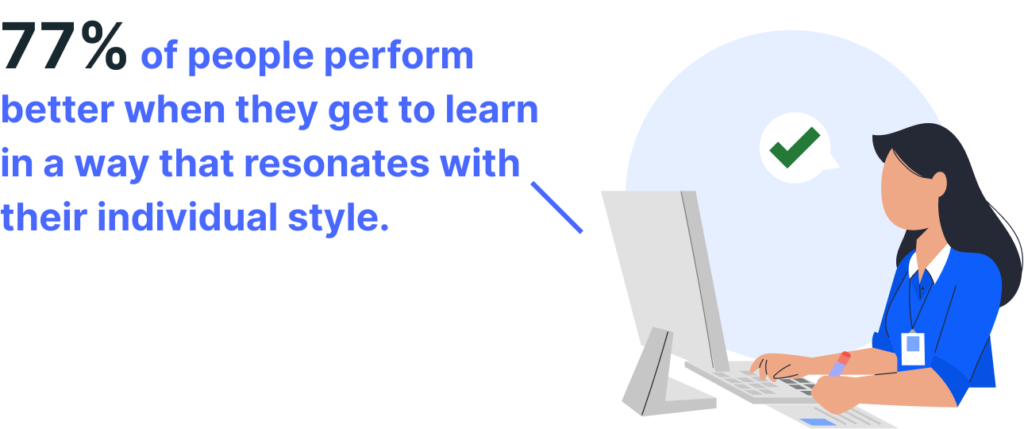
Now, let’s bring it closer to home. Think about the language learning app Duolingo; thanks to AI, it tailors lessons to your strengths and weaknesses, leading to a whopping 30% improvement in language skills. And here’s the kicker – using such adaptive platforms can slash training time in half, according to Ambient Insight. It’s not just about being tech-savvy; it’s about making learning a personalized and efficient experience for each of us.
Analysing Learning Effectiveness
Navigating the landscape of learning effectiveness analysis highlights a critical imperative: understanding how well training programs align with their intended objectives. This insight underscores the need for a real-time comprehension of training impact, demanding a solution that goes beyond theoretical ideals. Enter AI in learning and development with its transformative application through data analytics algorithms. This isn’t a distant concept but a tangible solution supported by concrete evidence. Picture a scenario where organisations employ AI to sift through extensive datasets generated by training programs.
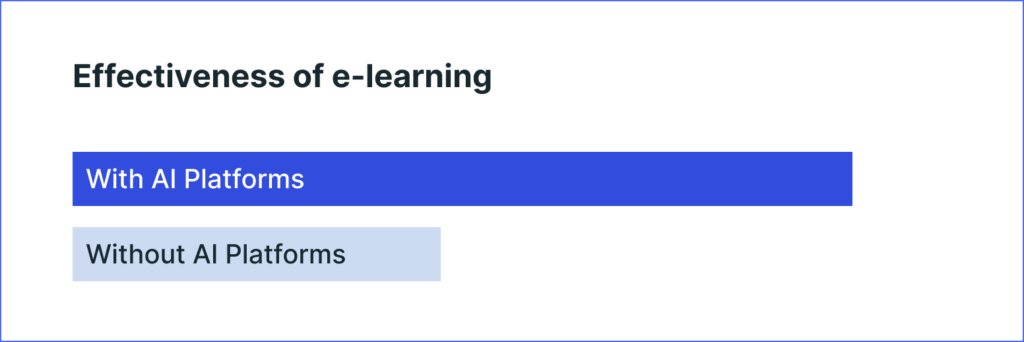
AI-driven algorithms meticulously evaluate the effectiveness of training modules in real-time, offering insights into efficacy and areas for improvement. According to McKinsey, companies leveraging data analytics for training evaluation witness up to a 20% increase in training effectiveness, solidifying AI’s pivotal role in assessing and actively enhancing the performance of training initiatives. The adaptability of this application lies in its capacity to make real-time adjustments based on feedback, ensuring that learning initiatives evolve organically and keep pace with dynamic learner needs and organisational objectives.
CEO as a trainer
Motivating your team to delve into new knowledge realms becomes an invigorating prospect with integrating AI in learning and development. Imagine this: a personalised training video featuring your CEO, a concept effortlessly realised through applications like elai.io. In just a few clicks, you can transform audio into a dynamic video, and yes, you can even craft a video using a CEO selfie. The power of custom videos lies in their ability to captivate and engage team members, offering a more immersive and easily retained learning experience. This approach transcends traditional training methods, infusing an element of personalisation and innovation that encourages skill development and transforms learning into a memorable and enjoyable journey for your employees.
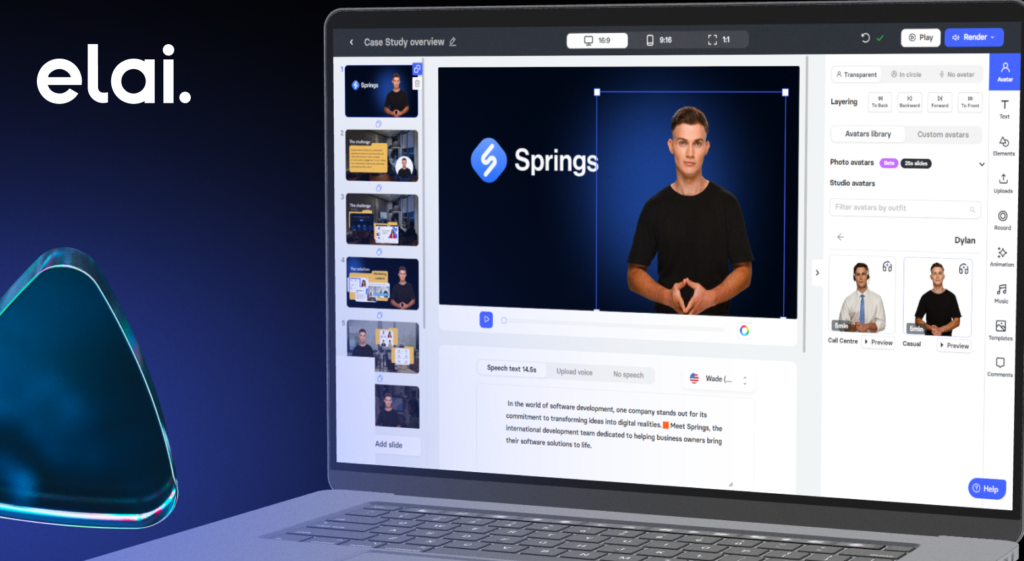
Feedback and Recommendations
Diving deeper into the world of refining learning experiences, it’s crystal clear that ongoing feedback is the secret sauce for constant improvement. We’re talking about a shift beyond the usual feedback routine – it’s a call for something more precise and dynamic. That’s where AI for learning and development steps in, not as a distant concept but as a tangible force driving personalised feedback and recommendations. No, this isn’t just lofty talk; it’s real-life stuff. Imagine AI seamlessly becoming a part of your learning journey, offering insights tailored just for you. It’s not the typical one-size-fits-all advice; it’s about getting feedback that’s as unique as your learning style. And here’s the kicker – studies show that organisations using AI for feedback and recommendations witness a substantial 15% improvement in employee performance, according to HR Technologist. It’s not about replacing the human touch; it’s about AI amplifying our learning experiences and providing tailored insights that fuel a culture of constant learning and improvement.
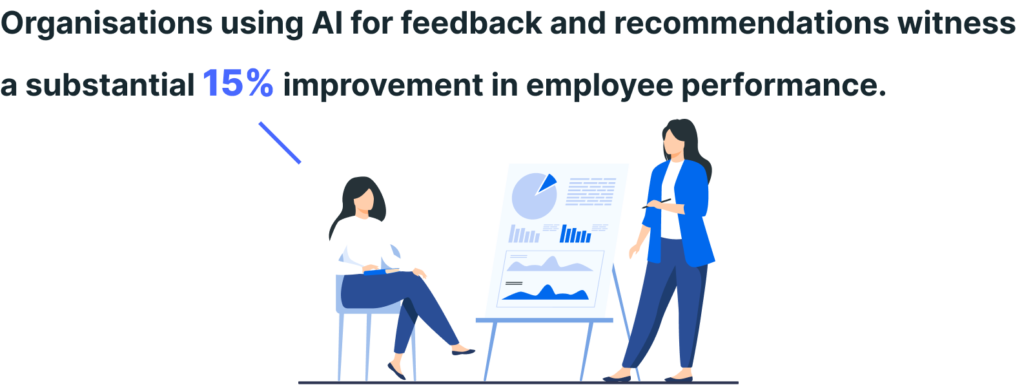
Summary
In essence, integrating AI in Learning and Development (L&D) doesn’t merely redefine training effectiveness; it ushers in a paradigm where learning becomes a dynamic and personalised journey. The insights into analysing learning effectiveness and the implementation of AI for ongoing feedback and recommendations converge to underscore a transformative reality. This isn’t about replacing traditional approaches; it’s about amplifying them. AI is a beacon, illuminating the path to more adaptive, individualised, and compelling learning experiences.
By embracing AI in learning and development, we’re not just enhancing training outcomes; we’re crafting an environment where each employee’s unique development needs and strategies are met with precision and flexibility, fostering a culture of continuous improvement and personalised growth. The use of AI isn’t a deviation from the human touch; it’s an augmentation, an ally that ensures our learning experiences are practical and resonate with the individual nuances that make each learning journey distinct.
